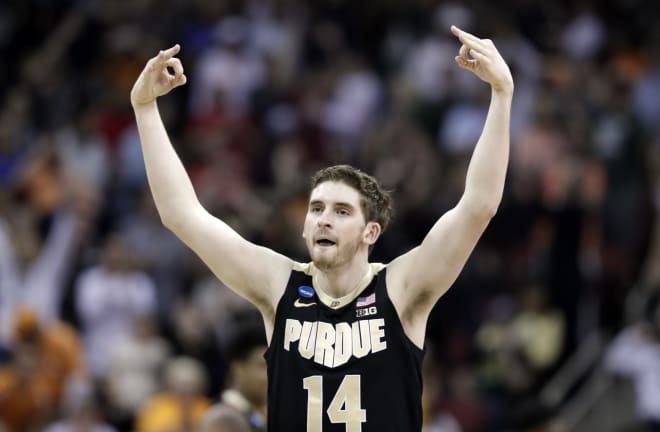Remembering Ryan Cline's iconic shot vs. Tennessee, a year ago today

With 46.3 seconds on the clock and Purdue down 80-77 to sixth-ranked and second-seeded Tennessee — one of the best teams in college basketball — Ryan Cline took a dribble handoff from Matt Haarms and the Volunteers switched the screen, putting SEC Player-of-the-Year Grant Williams out an island with Purdue's blazing-hot senior guard.
"That was my first instinct, that I had a 5 on me," Cline remembers. "But he moves like a 2 and he's pretty athletic, but he is a bigger guy and I just instinctually knew there was a big on me and there were eight or nine seconds on the shot clock and I'd been making a few shots, and this was my chance to get my own, and that's exactly what I did."
In the midst of a 27-point game — highlighted by his own surreal run of clutch shooting in the second half of a high-level, higher-stakes NCAA Tournament game — Cline dribbled around, tried to drive but was thwarted, dribbled around some more, then drove into Williams' body, setting up the step-back that set up one of the most memorable shots in Purdue's NCAA Tournament history and probably the biggest postseason win of the Boilermaker program's modern era.
Cline's deep three-pointer with 38 seconds left and four on the shot clock didn't win the game for Purdue — it needed Carsen Edwards' game-tying free throws, then overtime, for that — but Purdue almost certainly doesn't reach its first Elite Eight since the turn of the century without that shot, made one year ago today.
"It's the question people always ask me: 'How were you feeling during that game? What was going on in your head?' I don't know. I was just out there playing," Cline said. "But the one thing I will never forget is making that shot, making that move on the step-back, and then coming back down with just a straight face and looking up at my friends and family and the crowd just going absolutely berserk. That's the one moment I'll never forget from my college career and one thing I'll carry with me forever from my time as a Purdue Boilermaker."
This week, Cline, now an Orthopaedics sales rep in Carmel for Smith & Nephew, used some of his COVID-19 lockdown time to watch condensed versions of that Purdue-Tennessee game, twice. It was his second and third viewings of that classic Purdue NCAA Tournament moment.
Another vivid memory came from it, the realization that as Cline dribbled around, he drifted right into a potential help defender, since Tennessee's Lamonte Turner was essentially face-guarding Carse Edwards out to about 35 feet as the shot clock wound down.
"He was guarding Carsen right in his chest," Cline said. "If Turner would have stuck his hand out, he would have blocked my shot. I don't know if a lot of people have really noticed that. He was right next to me when I shot that shot, and if he'd just stuck his hand out, it could have been an entirely different ball game."
Instead, Cline nailed the last of his seven three-pointers, a shot Edwards would later say gave him "goosebumps."
Cline fouled out with 27 points soon after.
When he did, he told teammates, "Don't win it for me, win it for yourselves."
They did just that, dominating overtime and winning 99-94, to get to within a game of the Final Four.
Continue reading below
Edwards scored 29, as he tore through the NCAA Tournament like a fireball. But against Tennessee, Cline's 27 were the difference, and one final look for Purdue of what the sharpshooter was capable of, potential he essentially waited 'til senior year to showcase in a truly leading role, an even then, sort of as All-American Edwards' wing man.
"Obviously I had a star on my team and a guy who should have gone in the first round — that was BS that he didn't — in Carsen Edwards, probably the best player I've ever played with in terms of being able to score the ball and having that mentality," Cline said. "I'd get seven or eight, maybe nine, shots a game and shot at a pretty consistent clip. But then going in on that big stage with millions and millions of people watching ... Just being able to sort of come alive and get into that zone I knew I was capable of getting into more often was great."
A game after winning an epic NCAA Tournament game vs. the Volunteers, the Big Ten regular season champions came up short in every bit as memorable a game against eventual-champion Virginia, whose postseason life last season was a particularly charmed one.
"It's something that will always haunt me," Cline said. "I still haven't watched it and probably will never watch It. There were so many aspects of that game (that could have changed the outcome) and I know people don't always realize that when they go all over social media, but if somebody misses a free throw at the end, he just gets destroyed.
"In that instance, that was me. But there are so many different things that add up through the course of a game that it's not always just about the end of the game, but you're going to get most of the blame. I missed the free throw to go up four. I just still believe to this day that they were God's team to win it all after their loss to UMBC the year before."
Cline could take some modest catharsis from the fact that months later he returned to Mackey Arena and watched new-look Purdue beat new-look Virginia by 29.
When the cameras found him to show him on the video board, Cline chugged his Boiler Gold beer.
"My mom is still very upset about that," Cline said. "But I do take credit for the Virginia blowout, because I think I got the crowd really going with that beer show."
If so, it was the last basketball game Cline would impact.
After his senior year, he decided not to try to play professionally.
"Still to this day, I have really, really bad back issues," Cline said. "It's my lower back and I think it started about halfway through my junior year, when I tweaked my back pretty bad lifting weights and I was just never really the same after that. ... It's never really been back to that full 100-percent. In my job now, I might be standing in the O.R. four or five hours consecutively some days and it can be horrible pain when it gets to that fourth, fifth hour. My senior year, I could barely run the mile, because that last lap my back was about to give out. That's probably the main reason I decided not to play. I didn't think my body could take it."
Membership Info: Sign up for GoldandBlack.com now | Why join? | Questions?
Follow GoldandBlack.com: Twitter | Facebook | YouTube
More: Gold and Black Illustrated/Gold and Black Express | Subscribe to our podcast
Copyright, Boilers, Inc. 2020. All Rights Reserved. Reproducing or using editorial or graphical content, in whole or in part, without permission, is strictly prohibited.

